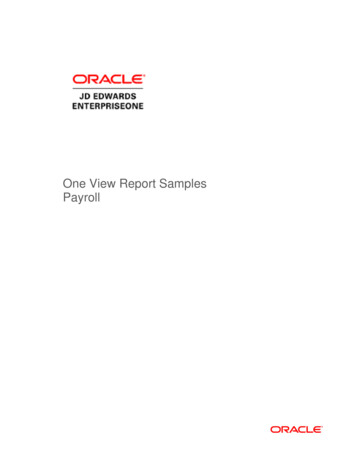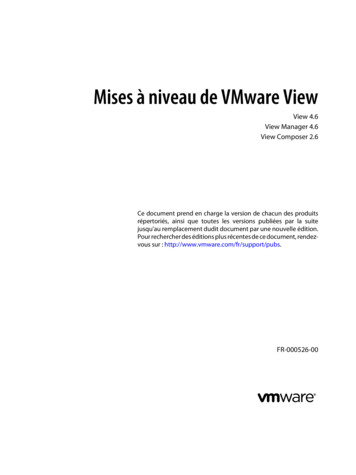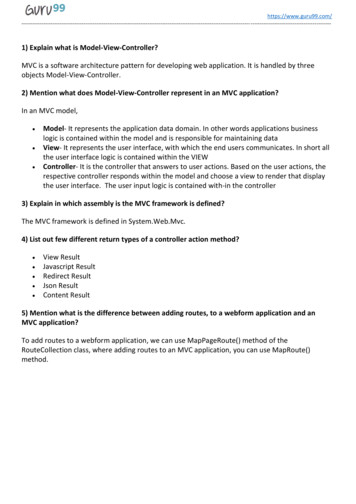
Transcription
Arts and Humanities Open Access JournalReview ArticleOpen AccessA psychoanalytic view on the constitution of thesubject in the work of Franz KafkaSummaryVolume 2 Issue 4 - 2018This essay provides a psychoanalytic perspective at the novel Letter to My Fatherby Franz Kafka. With a strong self-biographical content, Kafka makes a courageousexposition of himself in the relationship he had with his father and the interferencein his psychological development. Some aspects of this novel clearly address issuesthat refer to the Freudian theory of narcissism, the process of identification withparental figure, Oedipal aspects, the constitution of the Ego and its ideals as well asthe importance of the SuperEgo in the constitution of the subject. Freud believed thatthrough literary texts we can approach the concerns of the human soul. In his vastwork, Freud’s references to authors such as Goethe, Shakespeare, Dostoevsky, andSophocles are numerous. Literary texts give vent to human emotions and suffering.This is very clear in the text Letter to My Father which is the object of this essayby focusing on the relationship between Franz Kafka s words and Sigmund Freud’spsychoanalysis.Jose Luiz Cordeiro Dias Tavares1,2“Dearest Father: Once you asked me for what reason I used tosay that I was afraid of you. As usual, I was unable to think of whatshould I answer to you, partly for the fear that you bring to me thefear itself and its consequences do hamper me when I am in front ofyou. my appreciation of myself depended much more on you thanany other factor.” (Letter to My Father, Franz Kafka)“I would cry for having said too many things about the thingsthat are usually said, and not enough of those that are not. In theend, there is a way out for everything, except for the difficulty ofbeing, which never settles.” (Jean Cocteau)A flightless jackdawThe so-called Thirty Years War refers to a series of wars in Europein the seventeenth century fueled by religious, territorial and dynasticrivalries which brought economic and demographic difficulties to thatregion and their people. In Bohemia, as in other parts of Europe, therewas a real desertification of rural areas in this period, causing Jews tomigrate from neighboring countries due to their recognized experiencein the development of businesses in general. Jewish immigrants spokea “German Jewish” language, which could be described as Germanwith several expressions in Yiddish and, once a new statute forthe Jews was created in the late nineteenth century, they moved tourban centers where they sought assimilation through socio-culturalambience at big cities. The story of Franz Kafka’s family is the story ofmost Jewish families who settled there at that time. Josef Kafka, whowas the first to adopt this surname, which means “jackdaw” in Czech,married in 1802 and one of his sons, Jacob Kafka, became the father ofHermann Kafka. Hermann settled down with few financial resources,and shortly after marrying Julie Löwy in 1882 he opened a fabricstore that thrived thanks to his hard dedication to work. Shortly after,Hermann successfully expanded his business. Hermann establishedhimself thanks to his commitment, sacrifice and perseverance. Franzwas the first child born of this marriage, in Prague, in 1883. Two moreboys who died young and three daughters who died later during theNazi holocaust were also born of this marriage. Hermann is describedas an energetic man with strong temperament and Julie as a sweetSubmit Manuscript http://medcraveonline.comArt Human Open Acc J. 2018;2(4):226‒230.PhD in Medicine at University of London, UKGraduation in Psychoanalysis at Centro de EstudosPsicanalíticos, São Paulo, Brazil12Correspondence: Jose Luiz Cordeiro Dias Tavares, Rua BastosPereira 171, São Paulo, Zip Code 04507-010, Sao Paulo, Brazil,Tel (55) 11 9 8585 7298, Email jltavares2016@gmail.comReceived: July 31, 2018 Published: August 20, 2018and serene woman, always willing to mitigate her husband’s strongtemperament. In addition to Yiddish, Hermann’s children spokeGerman, which was his family’s native tongue in South Bohemia.Besides German and Yiddish, Franz also spoke Czech in an attemptto broaden his local communication. Based on the fact that they wereJews and having the habit of speaking German, Franz and his familywere seen as the minority of minorities, making it difficult for Franzto connect with other inhabitants of Prague. In this context, Franzwas exposed to the nationalistic feelings of Prague residents which,when combined with anti-Semitic prejudices, eventually led to streetdemonstrations against the Jews. Curiously, although he belonged toa family of Jews, Franz did not attend to the synagogue because hedid not see himself to be sufficiently involved in the Jewish religion.1,2Franz Kafka died in 1924. Six years later, Freud publishedCivilization and its Discontents, a text in which he points out therelevance of cultural conditions in the production of happinessand curiously also makes reference to the figure of the peasantsin the Thirty Years War as an example of the gradual numbness ofexpectations and a process of narcotization affecting the susceptibilityto sensations of pleasure as well as displeasure. He also commentsthat it is very important to consider the way in which social relationsbetween human beings are regulated in the process of civilization,whether as neighbors, as a source of support, as a sexual object and asa member of a family and then, he concludes that the cultural elementwould be the first attempt to regulate these relations.3The constitution of the subject occurs in the land of otherness, andthis is a process in which the language plays an important role, bothin the objectivity of communication and in the symbolism of what issaid as well as in the silence that sometimes is adopted as the onlypossibility for communication. Language is one of the possibilitiesthat the unconscious has to manifest itself. Therefore, interpersonalrelationship is not limited to the field of objectivity. The influence ofother’s gaze on us is a relevant constituent of our subjectivity and itis controlled by the unconscious, which receives external informationand determines the form in which it is possible to respond. Therefore,language itself should not be taken as the only and absolute reference226 2018 Tavares. This is an open access article distributed under the terms of the Creative Commons Attribution License, whichpermits unrestricted use, distribution, and build upon your work non-commercially.
A psychoanalytic view on the constitution of the subject in the work of Franz Kafkafor social communication. All symbols associated with language arequite important in this process.We know language is strongly influenced by historicalcircumstances in which it is inserted. History, both that related tosociety and that concerning family environment, is important in theconstitution of the subject since it exists even before its birth anddoes influence its constitution from the very beginning. Franz comesfrom a family exposed to migratory movements resulting from mainlyeconomic needs and, although born in Prague, Franz expressedhimself in three languages, probably not only because of culturalversatility but also because of the connection he had with his originscoupled with the need to adapt to the environment, which lead us tospeculate about a possible relationship of the dilution of the spokenlanguage with the dilution of Franz s own subjectivity. Obscure is theword Franz used when referring to himself in relation to his father inthe Letter to my Father, which is the object of this essay:“Let s compare the two of us: I am a shy and obscure persontotally interrupting myself quite often. You, on the other hand, is atrue Kafka in strength, health, appetite, loudness of voice, eloquence,self-satisfaction, worldly dominance, endurance, presence of spirit,experience, knowledge of human nature, a certain way of doingthings on a grand scale, and, of course, also with all the defectsand weaknesses that go with these advantages and into which yourtemperament and sometimes your hot temper do drive you”.4Franz’s speech is created in the context of social and culturalcircumstances in which both he and Hermann were insertedand responded to in opposite ways on the basis of their unequalsingularities, making it difficult to find a true connection betweenthem. Hermann was a migrant who responded to adversity withperseverance, seeking to overcome obstacles, aiming at a materialwell-being for himself and his family what made him to become amigrant of himself, without giving much value to non-pragmaticissues of daily life and without paying attention to those who wereused to surround him. In contrast, Franz presents himself as a fragilesubject at the mercy of a tyrant father. He also considered not havingmany points in common with the Jews aside from having little affinitywith himself as he used to say.2As previously mentioned, language is one of the ways for theunconscious to manifest itself, then, its relation to the external worldis not exclusively based on the field of objectivity. The speech of thespeaker produces a much broader and hidden discourse than the textthat is spoken. The subject of the discourse unconsciously refers tohistorical, social, cultural, ideological and emotional components, allof which exposed to the interference of external references that act byimpregnating the discourse that is spoken which, in the end, expressesthe uniqueness of human experience.In Introductory Lectures on Psychoanalysis5 Freud commentson the mental phenomena determined by the sociocultural contextand highlights some components of this process, for example, thesociocultural construction of these phenomena that occurs throughthe language, both in its occurrence as in the apprehension processby the individual. In the same way, he makes some reflections on thepassage from the unconscious to the conscious and questions howconsciousness may have access to the content that is in the unconsciousbeing this is a process in which, again, language plays a relevant role.In Civilization and its Discontents,3 we see Freud saying that culture isa process that is developed in humanity at the service of Eros seekingCopyright: 2018 Tavares227to bring together individuals, families, and then ethnicities, people andnations into the great unity of humanity, concluding that these humangroups should be linked libidinally with each other. Franz was bornin Prague in a time of social discomfort that would lead to the firstof two world wars thirty years after his birth. Franz experienced thisenvironment of progressive social tension and discontent. Franz wasa Jewish man who was fluent in three languages and did not go to thesynagogue as expected, becoming a minority among minorities andbeing exposed to anti-Semitic prejudices, as already mentioned. Inaddition he had particular and specific difficulties in the relationshipwith his father.It is accepted that sociocultural context in which the subject isinserted has a unique importance in his/her development, mainlybecause of the way in which it is captures and translates the elementsof this context and the resulting mental phenomena through language.The scenario where Franz established himself did not seem to besufficiently provided with symbols that could be positively structuringhis subjectivity and existence. Similarly, in his family universe, Franzwas unable to find the appropriate structure to establish a reasonablerelationship with his father, as he writes in the Letter to my Father:“I remember, for example, how we often undressed together in achanging room. I–meager, weak, small. You – strong, great, broad andI used to feel myself miserable, not just in front of you, but in front ofeverybody ”.4The representation contained in Franz’s words portrays hisperception of himself and expresses the emotional consequences thatthose words bring to him. His narrative may suggest that we are infront of a jackdaw outside the nest without the necessary drive to fly,with shortage of investment in its own desire.He is the rock, his work is perfect and his wayis right. (Deuteronomy 32:4)“From your armchair you ruled the world. Your opinion wascorrect, every other one was absurd and abnormal Your selfconfidence was so great. You seemed to have the mystery that alltyrants have in whom the reason is based on their appearance and noton their thoughts. everything you called out to me seemed to be aheavenly commandment, never forgotten, and it usually remained forme as the most important way to judge the world I could not satisfyyou because I did not have your strength, your appetite and your skillsand this was the greatest disgrace of all”.4In the text The Task of the Translator6 Walter Benjamin commentsthat the translation process implies a return to the original, since itis there where the law of its format lies. Then he raises the questionwhether translations may be valid for the readers who have not read theoriginal words. Therefore, we may ask to what extent any translationwould be able to aspire to be similar to the original. Benjamin goes ondiscussing the need to integrate various languages into a true languagein order that sentences, poems and judgments may harmonize eachother. However it is true that languages may harmonize each other,complete one another and reconcile each other through the way theyare expressed. We can then speculate on what Franz wanted to expressby writing the Letter to my Father.4 In other words, we may thinkabout how many languages of affection Franz was putting together,translating and integrating each other in his discourse. The text of theLetter to my Father is Franz’s perception about himself and his father,a clear emotional translation that he provides about his father andCitation: Tavares JLCD. A psychoanalytic view on the constitution of the subject in the work of Franz Kafka. Art Human Open Acc J. 2018;2(4):226‒230.DOI: 10.15406/ahoaj.2018.02.00062
Copyright: 2018 TavaresA psychoanalytic view on the constitution of the subject in the work of Franz Kafkahimself, with all the symbols pictured in his experience. As expressedin his words:“My writing was all about you; in my words I was able toregret what I could no regret upon your breast.the way you smileis extraordinarily beautiful and exquisite.you had magnificentcommercial talents. when facing any uncertainty or doubt youimmediately knew how to find the solution.a spectacle worthy to bewatched.”.4When speaking about his father, Franz speaks of himself,translating the force of Hermann’s image on himself. When he speaksof himself, Franz also speaks about his father when he writes: “thefeeling of nullity that masters me was imposed to me in a large extentby your influence you were used to censor me since the verybeginning, blocking may way Your verbal communication processcontained abuse, threats, irony, spiteful laughter I was used to go onliving as a not deserved gift I lost confidence in my own actions.theolder I became, more material was there for you to bring up againstme as an evidence of my worthlessness.”.4But, after all, who is Hermann Kafka? The description presented byFranz does not necessarily coincide with the testimony of others wholived with Hermann. For example, Max Brod, a friend of Franz fromhis youth, brings up a different perspective about Hermann saying thathe was a Jew who came from an environment of material scarcity andopened a profitable business in Prague, promoting stability for himand his family and, in addition, that he was a very nice and generousperson with his children, enabling Franz to get a good education, evenby giving him a trip at the end of his studies. Another example canbe seen in the recent edition of Letter to my Father in German,7 onthe occasion of the 80th anniversary of Franz’s death, which includedrecollections of Frantisek Basik, a Czech apprentice who workedtwo and a half years in Hermann’s shop in Prague. Basik describesHermann as a man with a good sense of humor who played withFrantisek during his working hours and even taking him to spend avacation with the Kafka family. In his account, Frantisek confirmsthat the work was hard, and the boss was strict, but, in some waysympathetic, calm, almost affectionate. The early years of Franz’slife were not referred at Franz s letter to his father making it difficultto reflect on the representations and associations that may have beenexperienced by him in his childhood. The perspective we highlightat this essay is the way by which Franz refers to his father in thistext4 and also the strong and assertive way he exposes his feelings inregards to the sensation of failure attributed to his father in regards toparental role in his development.In available biographies,1,2 we read that Franz had some professionaloccupations, starting at his father’s store, where he stayed for a periodof time to attend to repeated requests from his father to help him inbusiness without considering that this activity drew no interest fromFranz who, from an early age, was already attracted to literature. In1901, at the age of 18, Franz began his studies in chemistry and, in1902, he began to study literature and history of art. In that same year,Franz entered law school, obtaining his doctorate in 1906. Literaryactivity initiated in 1904 during his university course. After graduatingfrom university in 1907, Franz joined the private insurance companyAssicurazioni Generali. This activity kept him busy all day and hedid not have much time left to write. As a consequence, he decidedto move to the Workers’ Compensation Institute, which allowed himmore time flexibility for dedicating himself to writing. Literature waswhat fascinated him. However, his father did not approve this activity.228In the Letter to my Father he says:“.you used to address your aversion to my writing and toeverything that, unknown to you, was connected with that. myvanity and my self-esteem did suffer under your proverbial way ofhailing the arrival of my books: “Put it on my bedside table”. Thiswas the environment in which I was given the freedom to embrace acareer. But was I still capable of making any use of such freedom?Had I still any confidence in my own capacity to pursue a real career?The valuation of myself was much more dependent on you than onanything else. So I was not truly free to choose my career”.4Men cannot live without having the confidenceof something indestructible within himself(Aphorisms, Franz Kafka)In the Three Essays on the Theory of Sexuality, originally publishedin 19058 Freud refers to autoerotism as an anarchic state of infantilesexuality in which sexual drive finds satisfaction in one’s own bodywithout resorting to an external object. It is a pure local satisfaction,not organized and disjointed in relation to other partial satisfactions,i.e., the so-called pleasure of the organ in a fragmented body. A fewyears later, Freud investigates the relationship between self-eroticismand narcissism in the publication On Narcissism: An Introductionthat was released in 19149 in which he states that at early stages oflife there is not a unit that is comparable to the “Ego”. As drives arepresent since the beginning of life, something should be added to selferoticism as a new psychic action for narcissism to be constituted.In this same text, Freud tells us that narcissism is necessary for theconstitution of subjectivity, i.e., for the development of the “Ego”,which is considered the great reservoir of all libido available.Freud calls this stage of development as primary narcissism. Theconstitution of the “Ego” is affected by the revival of the narcissismof parents who ascribe to their child all perfections in the world andgrant him/her the privileges which they were forced to leave behind.The “Ego” that emerges from the unified image that the child makesof his own body and from this revival of the parents’ narcissism isthe “ideal Ego”, which corresponds to primary narcissism and givesthe subject a feeling of omnipotence, leading him/her to love himself.Later, the libido is redirected to objects (representations-object)leading to the transformation of the narcissistic libido into objectlibido but emphasizing that, throughout the life of the subject, the“Ego” continues being the great reservoir of the libido from whichlibidinal investments are sent to objects and collected from them,such as an amoeba that extends and then collects its pseudopods. Thereturn of libidinal investment to the “Ego” after investing on externalobjects is considered by Freud to be the secondary narcissism. It isworth emphasizing that he believes that these modes of libidinalinvestment should not be considered as successive stages, i.e., thereis no complete abandonment of the “Ego” in exchange for the object,nor afterwards a complete abandonment of the object investment infavor of the “Ego”. Both forms of investment may coexist even withthe predominance of one of them.In On Narcissism: An Introduction,9 Freud introduces the concepts“ideal Ego” and “ideal of Ego” and says that the self-love feeling thatis enjoyed in childhood through the real “Ego” lies on this “ideal Ego”and that this narcissism is displaced into this “ideal Ego”, which, likethe infantile Ego, finds itself in possession of all valuable perfections.Like everything that occurs under the domain of the libido, Freud saysthat during their psychic development, human beings demonstrate toCitation: Tavares JLCD. A psychoanalytic view on the constitution of the subject in the work of Franz Kafka. Art Human Open Acc J. 62
A psychoanalytic view on the constitution of the subject in the work of Franz Kafkabe unable to renounce the satisfaction that was once enjoyed at earlytimes. They do not want to deprive themselves of the narcissisticperfection that is characteristic of childhood. This sensation, however,cannot be maintained when they grow up and this state of mind isdisturbed by the admonitions of others and by the awakening of theirown judgment about life. Consequently, this leads them to seek forrecovering of this state through the new psychic instance named“Ideal of Ego”.The “Ideal of Ego” is a psychic instance resulting from thereconciliation of narcissism and idealization of the “Ego” with theprocess of identification with the parents, their demands and/or alsowith their substitutes in society defining rules and laws to be followed.The “Ideal of Ego” turns to be a standard in relation to which thesubjects measures themselves and commit to fulfilling the demandsthat are presented to them in order to be loved and recognized beingthis a process that generates conflict and psychic suffering. The “Idealof the Ego” actually represents the identification built up on the figureof the father who is what we would like to be, as clearly indicatedby Franz several times in Letter to the Father,4 whenever his wordsreveal relevant signs of praise related to Hermann.In The Future of an Illusion, published in 1927,10 Freud drawsattention to the ambivalence of the father-child relationship in whichthere are strong feelings of affection but also of severity: “We foundourselves in a similar state of helplessness as young children inrelation to our parents. We had reasons to fear them, especially ourfather; yet we were certain of his protection against the dangers oflife”.10In Jewish families, paternal authority is unquestionable, andchildren are instructed to honor and fear this image of authority. InJewish families, the father is the center of everything, the lord who hasthe control of everyone and whose power rests on images as ancientand irrefutable as presented in the biblical passage found in Isaiah64-7 which says “O Lord, thou art our father; we are the clay, andthou our potter; and we all are the work of thy hand”. The father isthe first “other” the child discovers after the mother. The presenceof the father is what defines the rules as well as the limits for livingand then allows the transition of the child from family world tosociety and the consequent entrance into the culture. In this way, it isguaranteed the state of security that is necessary for the child to makehis/her own decisions in life, allowing him/her to explore the worldand then return to the family with the assurance of be welcomed. Thefather is the one who brings the perspective of “otherness” which isa critical experience in the process of subject s psychic development.It is due to this experience that the child is presented to the feelingof belonging to a group which do facilitate the process required forhuman development. Franz goes on in his life without being able toauthorize himself in taking decisions that would make him able tosupport his own choices. In order to be able to grant permission tolife, it is necessary for the subject to have the “praxis” of his ownand, not, be a faithful copy of his master however without losing theperspective about the relevance of this master. Getting married is oneof the steps that Franz wanted to accomplish but never succeeded. Itwas after his unsuccessful third attempt that he wrote the letter4 to hisfather.Franz had several love experiences. Some were short andsome were deeper and longer, capable of influencing the course ofhis life. One of his main relationships was with Felicia Bauer, who1,2Copyright: 2018 Tavares229fascinated him to such extent that he decided to propose to her.They were engaged between 1912 and 1914 and, during this period,Franz could not decide between getting married and overcoming hisisolation, or preserving his independence and personal freedom evenpaying the price of his solitude. Despite this hesitation, Franz didnot take the initiative to break the engagement with his fiancée whatwas then decided by Felicia herself. Two years later, in 1916, Franzfinds her again and resumes the relationship. In 1917, Franz had hisfirst episode of hemoptysis due to tuberculosis what made it difficultfor him to marry her. Then, in the end of 1917 they terminated theengagement. In 1919, at the age of 36, Franz met Julie Wohryzek,to whom he became engaged, but soon after he got to know MilenaJesenka-Pollakova and established an intense relationship with her,despite the fact he was still engaged to Julie and Milena was married.By Milena’s demand, Franz broke up the engagement with Julie buthe never got to be married to Milena, since she refused to leave herhusband.In the end of 1919, feeling disappointed by the cold receptiongranted by his father in regards to the announcement he made abouthis engagement to Julie, Franz wrote the Letter to my Father wherehe comments about the interaction with his father in relation to hisloving experiences: “.first of all you rank the failure of the marriagesat the same level you do with the rest of my failures. you underratethe importance of this matter. getting married, raising a family withchildren, supporting them in this insecure world and perhaps evenguiding them for a while until the limit that a man can reach.ourneeds are quite different; what is important to me is just superficialfor you . soon after I told you about my project in regards to gettingmarried to Julie you told me that she probably got dressed with a fancyblouse, like those Jew girls are used to do Prague, and that this mayhave influenced my decision in regards to getting married to her”.4The suffering that Franz exposes in this auto-biographical Letter tomy Father4 points out the failure of his father in exercising his parentalrole, a relevant step that is needed in the process for constitution ofsomeone s subjectivity. The failure of Franz s attempts to establishlasting love bonds could indicate some degree of frustration relatedto such initiatives that he was not able to sustain, experiencing thesour taste of failure in many situations. Marriage would be such anew literature to be written in his life, a guarantee of self-liberationand independence that maybe would allow him to write a letter to hisfather with a different content. Franz also considered that, throughmarriage, he could live up to the image of his father, but in orderto reach this, Hermann should have been the father who grants hisson the recognition of power, something that never occurred as Franzsays: “You could have never humiliated me more deeply with wordsin addition to showing me very clearly the contempt you had towardsme My choice of a girl to be engaged meant nothing at all to you You have always smashed (unconsciously) my power of decision.Again as a sign of your complete misunderstanding was the fact thatyou believed that I—timid, hesitant, suspicious—would be able toquickly decide about marriage seduced by a blouse. Neither of thegirls has disappointed me, only I disappointed both of them. It isthe overwhelming pressure of anxiety, weakness and self-contempt”.4There is no sufficient investment from Franz in his subjectivity tomake it possible for him to sustain his own desire and, in this process,he compares his “Ego” to his “Ideal of Ego” represented by his fatherwhen he says:Citation: Tavares JLCD. A psychoanalytic view on the constitution of the subject in the work of Franz Kafka. Art Human Open Acc J. 2018;2(4):226‒230.DOI: 10.15406/ahoaj.2018.02.00062
Copyright: 2018 TavaresA psychoanalytic view on the constitution of the subject in the work of Franz Kafka“Marriage certainly is the more explicit guarantee for me in orderto reach self-liberation and independence. I would have a family that,in my opinion, is the highest status one can achieve. I would be at thesame position that you are and all previous and even new shame andtyranny episodes would just be mere history.I could picture myself inthis situation of equality which would then arise bet
The story of Franz Kafka's family is the story of most Jewish families who settled there at that time. Josef Kafka, who was the first to adopt this surname, which means "jackdaw" in Czech, married in 1802 and one of his sons, Jacob Kafka, became the father of Hermann Kafka. Hermann settled down with few financial resources,











